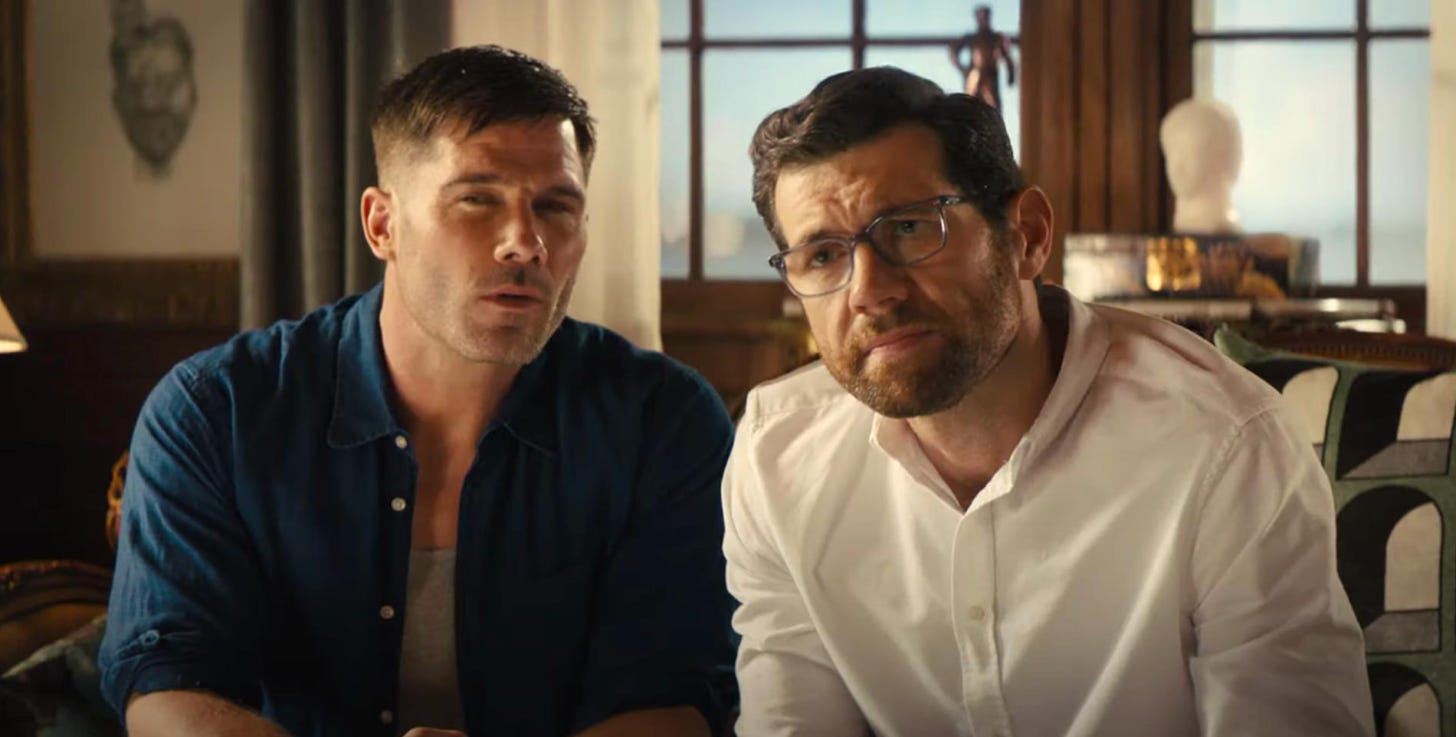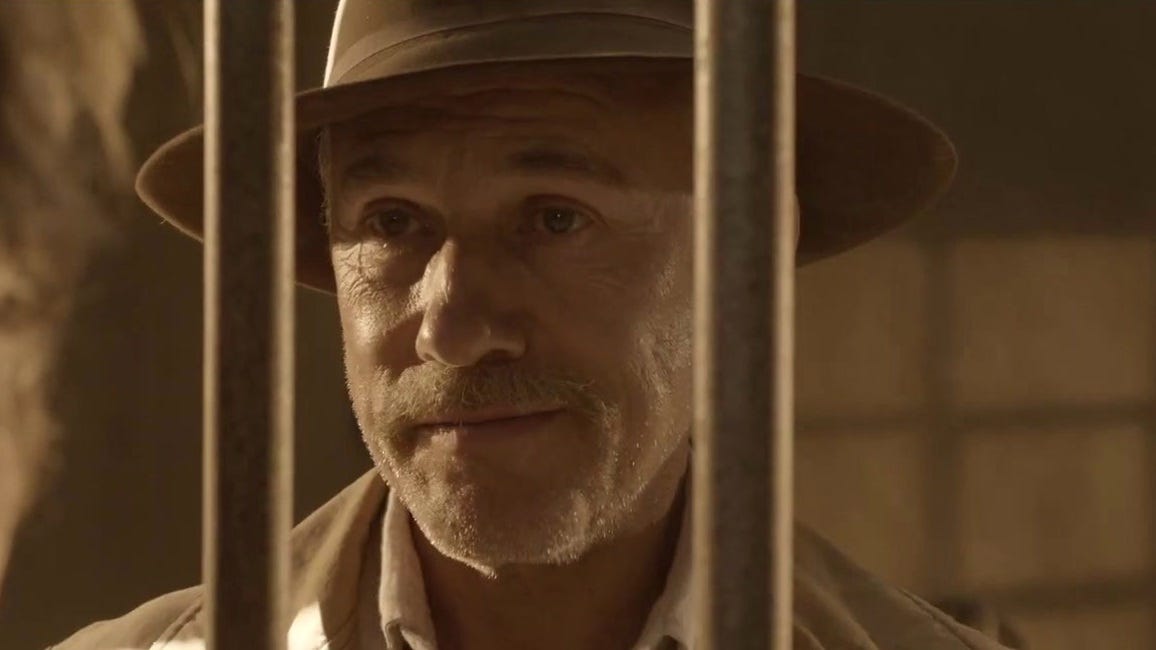In Review: 'Bros,' 'Dead For a Dollar'
Billy Eichner stars in an unabashedly gay rom-com while Christoph Waltz and Willem Dafoe square off in a new Walter Hill western.
Bros
Dir. Nicholas Stoller
115 min.
Early in Bros, fortyish protagonist Bobby Lieber (Billy Eichner) explains to his podcast audience why the gay rom-com he tried to make never got off the ground, in spite of the interest of a sympathetic studio executive who wanted a movie that a broad audience could enjoy that celebrated the notion that “love is love.” For Bobby, that’s the stumbling block. An author, podcaster, activist, and director of the soon-to-open, first-of-its kind LGBTQ+ history museum, he’s wary of the sentiment for two reasons: It’s unfair to reduce the complexity of 21st century LGBTQ+ relationships to such a traditionally heteronormative sentiment and he’s never been in love.
It’s both a meta moment and a mission statement for Bros, touted as the first major-studio gay romantic comedy, with an openly gay man as its star and co-writer (with director Nicholas Stoller . Bobby might not have figured out a way to make a mainstream-friendly movie with a gay protagonist that worked as both comedy and romance that didn’t erase or marginalize those with no interest in a socially approved, monogamous love-marriage-and-all-that relationship. But has Eichner? Short answer: pretty much, yeah. Bros is very much a rom-com, from its meet-cute to its (spoiler?) happy ending. But it takes a winding path from Point A to Point Z that makes stops no rom-com has made before.
Bobby doesn’t begin the film as a sad, lonely mess. (He’s testy, sure, but as anyone who’s seen Eichner before knows, testy is his comfort zone.) But he makes a pretty good argument that between his friends and his dating-app hook-ups (which the film mines for awkward humor but without judgment), he’s able to piece together all the components of a satisfying relationship. Almost. After locking eyes with Aaron (Luke Macfarlane), a handsome lawyer his age who’s more familiar with Garth Brooks than Mariah Carey, he starts to wonder if his priorities might have shifted a bit.
Bros is at once a breakthrough and a throwback. The milieu is new for rom-coms, but the form is familiar. Judd Apatow serves as executive producer, making it a reunion of sorts with Stoller, who broke through with Apatow-produced rom-coms like Forgetting Sarah Marshall and The Five-Year Engagement. It features some of the drawbacks of the Apatow style that dominated comedy in the ’00s and ’10s, particularly stop-and-start pacing and weird tonal shifts. (Especially in a late-film scene in which Bobby experiences roid rage.) But it also features many of the pleasures of that style, including a willingness to focus on characters rather than whisking the narrative along and allow the supporting cast — which includes Jim Rash, Amanda Bearse, and Bowen Yang — moments in the spotlight.
The film is overstuffed and at times feels like Eichner has tried to squeeze everything he’s ever wanted to say into one movie, from the erasure of gay history to issues of body image and identity to the pros and cons of mainstream acceptance. (Some of the film’s funniest moments find Bobby casting a jaundiced eye at developments like Hallmark Channel movies with gay characters.) But this also lets Bros include some particular and clearly personal moments, like a stay at a Provincetown summer home, owned by a character played by Harvey Fierstein, that allows for some reflection on the losses experienced by a previous generation of gay men and a monologue in which Bobby explains how his confidence has developed as a defense mechanism shaped by years of obstacles and discouragement. (The latter gives Eichner a chance to reveal some considerable dramatic depths.)
While Bobby and Aaron’s happy ending might come as no surprise, the film’s frank and funny approach to sex—which often takes the form of enthusiastic and explicit (if mostly underwear-on) love scenes—presents monogamy as one choice among many, and one that might benefit from a little experimentation along the way. It’s a gay rom-com that checks all the expected boxes without sacrificing its integrity. Bobby might even like it. —Keith Phipps
Bros opens in wide release tonight.
Dead for a Dollar
Dir. Walter Hill
114 min.
It’s easier to appreciate the individual parts of Dead for a Dollar, Walter Hill’s first film since the regrettable (but memorable) The Assignment in 2016 and his first western since 1995’s Wild Bill, than the film as a whole. Star Christoph Waltz delivers a memorable, cryptic performance as Max Borlund, a soft-spoken bounty hunter, playing opposite Willem Dafoe as Joe Cribbens, a recidivist nogoodnik whose release from prison Max knows will mean he’ll only have to capture him again (or worse). Dedicated to western filmmaker Budd Boetticher, known for making economical films built around moral dilemmas, it echoes Boetticher’s approach with an intriguing story concerning Rachel (Rachel Brosnahan), an army wife who, her husband husband (Hamish Linklater) claims, has been abducted by Elijah (Brandon Scott), a Black soldier under his command. Only, as Max discovers when he catches up with the pair, it’s not an abduction at all but an attempt to flee an abusive marriageand pick up a little ransom money to aid their escape). What to do, what to do?
It’s a fine set-up and a well-played one, too. But Dead for a Dollar only picks up momentum in its final stretch, a reminder that Hill can still stage a gunfight with the best of them. Until then it kind of pokes along from incident to incident. Scenes don’t flow into one another so much as simply stop. And, most troubling of all, it’s rough on the eyes. Hill’s use of digital photography allows him to remove most of the colors from the palette but it also makes the film look more low-budget than it must have been, given the cast. He’s always been a no-frills director but it’s usually a feature not a bug. Here a frill or two might have helped elevate a merely pretty good movie into an oater to remember. —Keith Phipps
Dead For a Dollar opens in limited release tonight.








Was just rewatching Midnight Mass last week and wondering why Hamish Linklater isn't in more things. It has its weak points (seriously, does EVERY character get a big actorly monologue about the Trauma That Shaped Who They Are!?!) but man was that a great show and a very strong cast. It was especially great going into it totally blind and finding out the premise as I went. Also a relief to see Flanagan right the ship after the shitshow that was Haunting of Bly Manor.
I was trying to think where else I'd seen Linklater turn up (that Miranda July movie whose name I'm blanking on? That one season of Fargo?). He's always an interesting presence.
> Hill’s use of digital photography allows him to remove most of the colors from the palette
See, this all by itself make me not want to see movie. Think Sesame Street would have taken off if me were grey and Oscar were grey and Bird were grey and Bert & Ernie were grey and grey?